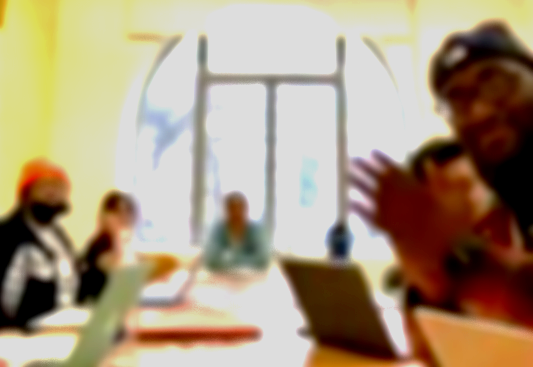2025 Close Readings
Mei-Mei Berssenbrugge leads a thinking-and-reading-through of Elizabeth Willis.
On Thursday, March 6th, 2025, Mei-Mei Berssenbrugge led a thinking-and-reading-through of “I Didn't Invent the World” by Elizabeth Willis, followed by a short reading of her own work.
Born in Beijing, Mei-mei Berssenbrugge is the author of fourteen books of poetry including Hello, the Roses, Empathy, I Love Artists and A Treatise on Stars, which was shortlisted for the Pulitzer Prize and the National Book Award. Her collaborations include works in theater, dance, music, and the visual arts. She received the Bollingen Prize for poetry in 2020.
Samiya Bashir leads a thinking-and-reading-through of Carl Phillips.
On Thursday, February 20th, 2025, Samiya Bashir led a thinking-and-reading-through of “Rubicon” by Carl Phillips, followed by a short reading of her own work.
Samiya Bashir is a multi-media poet, writer, librettist, and artist whose solo and collaborative work has been widely published, performed, installed, printed, exhibited, screened, experienced, and Oxford comma’d from Berlin to Düsseldorf, Amsterdam to Accra, Florence to Rome, and across the United States. Bashir is the author of three poetry collections, most recently Field Theories, winner of the Oregon Book Award. Her fourth collection, I Hope This Helps, is forthcoming in Spring 2025. Bashir lives in Harlem, NYC.
Eugene Ostashevsky leads a thinking-and-reading-through of Lyn Hejinian.
On Thursday, February 6th, 2025, Eugene Ostashevsky led a thinking-and-reading-through of “The Unfollowing: 7” by Lyn Hejinian, followed by a short reading of his own work.
EUGENE OSTASHEVSKY is a poet and translator whose writing has been described as “translingual” because of its focus on multilingualism and linguistic interference. HisThe Feeling Sonnets (Carcanet, NYRB Poets, 2022) examines the effect of speaking a nonnative language on emotions, parenting, and identity. An earlier book, The Pirate Who Does Not Know the Value of Pi (NYRB Poets, 2017), discusses communication difficulties between pirates and parrots.As a translator, Ostashevsky is best known for his editions of the Russian avant-garde, such as OBERIU: An Anthology of Russian Absurdism (Northwestern UP, 2006). His more recent translations include Lucky Breaks by the Ukrainian fiction writer Yevgenia Belorusets (New Directions, 2022).His work has appeared in Best American Poetry(US) andThe Forward Book of Poetry(UK), and won the National Translation Award (US), the City of Münster International Poetry Prize (DE), the Berliner Künstlerprogramm des DAAD fellowship (DE), and other prizes.
[Photo credit: Eva Ostashevsky]
Omar Berrada leads a thinking-and-reading-through of Henry Dumas
On Thursday, January 23rd, 2025, Omar Berrada led a thinking-and-reading-through of “The Zebra Goes Wild Where the Sidewalk Ends” by Henry Dumas, Followed by a short reading of his own work
Omar Berrada is a writer and curator whose work focuses on the politics of translation and intergenerational transmission. He is the author of the poetry collection Clonal Hum (Obultra, 2020), and the editor or co-editor of several books, including The Africans, on racial dynamics in North Africa (Kulte, 2016); La Septième Porte, a posthumously published history of Moroccan cinema by Ahmed Bouanani (Kulte, 2020); and Another Room to Live In: 15 Contemporary Arab Poets (Litmus, 2024). His writing was included in numerous exhibition catalogs, magazines and anthologies, including Frieze, Bidoun, Asymptote, The University of California Book of North African Literature (UC Press, 2012), and Poetic Justice: An Anthology of Contemporary Moroccan Poetry (Texas UP, 2020). He grew up in Casablanca and currently lives in New York.





